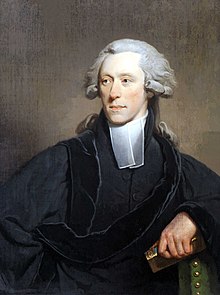Sebald Fulco Johannes Rau
Sebald Fulco Johannes Rau (born October 16, 1765 in Utrecht , † December 1, 1807 in Leiden ) was a Dutch poet , orientalist and Reformed theologian .
Life
Sebald Fulco Johannes Rau was the son of the philologist and Reformed theologian Sebald Rau (1724-1818). He had developed an early interest in languages in his father's environment. So he learned the French, English, German and Italian languages. At the Latin School in Utrecht he had further developed his knowledge of Latin, Greek and Oriental languages. At the age of fifteen he joined the circle of poets of Jacobus Bellamy , who had formed in the society Dulces ante omnia Musae and he himself wrote a treatise comparing the heroes of Homer with the Arabs. In this context, two writings were created from 1784 onwards. One about the poetic spectator and one about testing the mind, taste and heart. For the first, Rau wrote the preface, in which he spoke out against the sentimental fashion of the literature of his time, and in the second his chivalric romance Ewald and Elize appeared. After the death of his friend Bellamy, he wrote a funeral suit against him. Rau, however, did not share the patriotic sentiments of some of the poets' circle.
In 1784 Rau had enrolled at the University of Utrecht . Here he initially attended the lectures given by his father, Johann Friedrich Reitz , Christoph Saxe , Johann Friedrich Hennert and Johannes Theodorus Rossijn . After he had largely completed these studies, he began studying theology, for which he attended the lectures by Frans Burman , Gisbert Bonnet , Jacob Albert Vos and IJsbrand van Hamelsveld . After visiting Herborn, he decided to become a pastor. On January 20, 1786 he was appointed pastor of the Walloon parish in Harderwijk , which office he took up on June 18 of the same year. A short time later, on August 23, 1786, he was appointed pastor to Leiden, which office he took over on November 19 of that year. On November 17, 1787, the curators of the University of Leiden appointed him professor of theology. After he was appointed an honorary doctorate in theology by the university's senate on March 1, 1788, he took over the theological chair on April 12, 1788 with a speech de eo quod jucundum est in studio theologico . After the death of Everard Scheidius , on September 13, 1794, he received the chair of Oriental languages and Hebrew antiquities, which he won on October 18 of that year with the speech de Poëseos Hebraicae prae Arabum Poësi praestantia, tam veritatis quam Divinae majestatis Religionis, in Veteri Codice Sacro traditae, argumento began . In the conflicts of the Batavian Republic he was released from his theological professorship on February 21, 1795 as a supporter of the governor's party. Nevertheless, the curators in Leiden managed to keep him there as a teacher.
From March 21, 1799 he had given lectures on the doctrines of ethics and was reinstated on May 4, 1799 in his theological chair and that of the oriental languages and antiquities, for which he wrote the speech de Poëticae facultatis excellentiâ et perfectione, spectata in tribus Poëtarum principibus, Scriptore Jobi, Homero et Ossiano held. In this capacity he switched to the philosophical faculty. He also participated in the organizational tasks of the university and was rector of the alma mater in 1797/98 and 1804/05 . At the resignation of the office he gave the speeches de Jesu Christi ingenio et indole perfestissimis, per comparationem cum ingenio et indole Pauli apostoli illustratis (Leiden 1798) and de Natura, optima Sacrae eloquentiae magistra (Leiden 1806). The great explosion (Leidens Ramp) had also hit his household, with a large number of unprinted manuscripts being lost. When Louis Bonaparte then visited Leiden, he was awarded the Union Order as a Knight in January 1807 . He was also a member of the Royal Society of Sciences in Haarlem, a member of the Society of Dutch Literature in Leiden, was curator of the Stolpischen Legate, a member of the Utrecht Society, a member of the Zeeland Society and other learned societies. He died of a brief but intense illness.
On January 28, 1794, he married Gertrude Stephanie, Countess van Randwijck. There are two daughters and four sons from the marriage.
literature
- Josué Teissèdre l'Ange, Willem Bilderdijk: Lofrede en lijkzang op Sebald Fulco Johannes Rau. Enschede and Son, Haarlem, 1808, ( online )
- CA Siegenbeek van Heukelom-Lamme: Album Scholasticum Academiae Lugdono-Batavae MDLXXV-MCMXL. Brill Archive, Leiden, 1941
- General Literature Newspaper. Halle and Leipzig, 1812, vol. 2, p. 254 ( online )
- J. Nat: RAU (Sebald Fulco Johannes) . In: Petrus Johannes Blok , Philipp Christiaan Molhuysen (Ed.): Nieuw Nederlandsch Biografisch Woordenboek . Part 9. N. Israel, Amsterdam 1974, Sp. 842–843 (Dutch, knaw.nl / dbnl.org - first edition: AW Sijthoff, Leiden 1933, reprinted unchanged).
- Abraham Jacob van der Aa : Biographical Woordenboek der Nederlanden. Verlag JJ van Brederode, Haarlem 1874, vol. 16, p. 94, ( online , Dutch)
- Barend Glasius: Biographical Woordenboek van Nederlandsche Godgeleerden. Muller Brothers, 's-Hertogenbosch, 1856, Vol. 3, p. 140, ( online , Dutch)
Web links
Individual evidence
- ^ W. Christiaenes, M Evers: Patriotse Illusies in Amsterdam en Harderwijk. Lost Hilversum, Hilversum, 2002, ISBN 90-6550-687-X , p. 67 ( online reading sample )
- ↑ Philipp Christiaan Molhuysen: Album Promotorum Academiae Lugduno Batavae 1575-1812. The Hague, 1913-1924
| personal data | |
|---|---|
| SURNAME | Rau, Sebald Fulco Johannes |
| ALTERNATIVE NAMES | Rau, Sebald Fulco Joannes; Rau, Sebald Fulco Jean |
| BRIEF DESCRIPTION | Dutch poet, reformed theologian and orientalist |
| DATE OF BIRTH | October 16, 1765 |
| PLACE OF BIRTH | Utrecht |
| DATE OF DEATH | December 1, 1807 |
| Place of death | Suffer |
